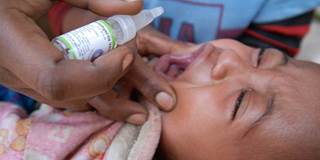The plight of more than 200 girls abducted in northern Nigeria is a brutal reminder of just how vulnerable children in Africa – particularly girls – can be. Though terrorism is an insidious threat to Africa's children, the biggest risk they face is disease, which often can be prevented through routine immunization.
GENEVA – The plight of more than 200 girls abducted in northern Nigeria is a brutal reminder of just how vulnerable children in Africa – particularly girls – can be. But it is equally important to recognize that this is not a true reflection of modern Africa, and that African leaders are strongly committed to protecting their countries’ children. Their ability to provide the same kind of protection that children in wealthy countries enjoy requires two key ingredients: partnership and conviction.
That is because, though terrorism is an insidious threat, the biggest risk to Africa’s children is disease, which often can be prevented through routine immunization. Indeed, as the world debates the best way to recover the missing girls, another menace is resurfacing: the World Health Organization recently declared the spread of polio an international public-health emergency, with several African countries now posing an ongoing risk of exporting the disease.
Fortunately, there are immediate and tangible ways to beat polio and a host of other vaccine-preventable diseases that currently claim innocent lives in Africa and beyond. Moreover, African leaders recognize that the best way to provide children with long-term and sustainable protection is through routine immunization. Earlier this month, African leaders meeting in Nigeria’s capital, Abuja, endorsed the Immunize Africa 2020 declaration, committing themselves to invest in a healthy and sustainable future for all children in their countries.

GENEVA – The plight of more than 200 girls abducted in northern Nigeria is a brutal reminder of just how vulnerable children in Africa – particularly girls – can be. But it is equally important to recognize that this is not a true reflection of modern Africa, and that African leaders are strongly committed to protecting their countries’ children. Their ability to provide the same kind of protection that children in wealthy countries enjoy requires two key ingredients: partnership and conviction.
That is because, though terrorism is an insidious threat, the biggest risk to Africa’s children is disease, which often can be prevented through routine immunization. Indeed, as the world debates the best way to recover the missing girls, another menace is resurfacing: the World Health Organization recently declared the spread of polio an international public-health emergency, with several African countries now posing an ongoing risk of exporting the disease.
Fortunately, there are immediate and tangible ways to beat polio and a host of other vaccine-preventable diseases that currently claim innocent lives in Africa and beyond. Moreover, African leaders recognize that the best way to provide children with long-term and sustainable protection is through routine immunization. Earlier this month, African leaders meeting in Nigeria’s capital, Abuja, endorsed the Immunize Africa 2020 declaration, committing themselves to invest in a healthy and sustainable future for all children in their countries.